Presidents 28-30
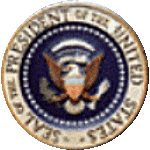

Woodrow Wilson
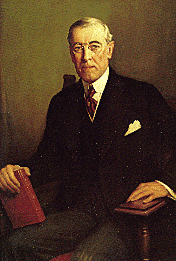
Someone once said that Woodrow Wilson "was more than just an idealist; he
was the personification of the heritage of idealism of the American people. .
. . He was a born crusader." Wilson always tried to do what he felt was
right. But his stubbornness kept him from winning the fight that mattered most
to him: the struggle to have United States join the League of Nations.
Thomas Woodrow Wilson was a sickly boy and "slow learner" who was
unable to read at age 9. As a young man, he enrolled in several colleges, but
dropped out because of poor health. But Wilson kept going back to school and
eventually earned a Ph.D. in political science from Johns Hopkins. Wilson was
a religious man and a serious scholar. He also had a keen sense of humor and
fun.
Wilson taught political science, history and law at various universities from
1885 until 1902, when he was elected president of Princeton University. He
also wrote books and dabbled in Democratic politics. In 1911, the Democratic
Party bosses of New Jersey decided to run Wilson for governor, expecting that
he would be easy to control. Wilson won, but surprised the bosses by
instituting a program of reform that gained him a national reputation.
In 1912, the Democrats chose him as their presidential candidate. President
Taft was the Republican candidate, but Theodore Roosevelt took away Republican
votes from Taft by running as a third party candidate. Taft and Roosevelt
split the Republican vote and Wilson was elected President.
Although Wilson wanted to concentrate on a progressive domestic program,
foreign affairs demanded his attention. In 1914, World War I broke out in
Europe. Germany's submarine warfare angered Americans. Wilson, however, wanted
no part of the war. In 1916, he won reelection on the slogan "he kept us
out of war." But Wilson was unable to keep the United States out of the
war in his second term. Not only did Germany continue to pursue unrestricted
submarine warfare, but the publication of the Zimmermann telegram (which
promised German aid to Mexico if Mexico decided to attack the United States)
angered Americans. On April 2, 1917, Wilson asked Congress for a declaration
of war on Germany.
While the Allied armies fought to win the war, Wilson prepared for the peace
that would follow. His plan became known as the Fourteen Points. It called for
an end to secret agreements between nations, limits on arms, national
self-determination, and an international League of Nations.
When the war ended, Wilson was welcomed in Europe as a world hero. Millions
hoped his plan would end war forever. However, the other Allied leaders were
not so enthusiastic. Wilson was forced to modify many of his plans.
Wilson returned to the United States only to find that many Americans and many
in Congress had strong reservations about American participation in a League
of Nations. The President embarked on a whirlwind speaking tour in the hope of
selling his plan to the people. The strenuous schedule broke his health and
Wilson suffered a stroke. While he was convalescing at the White House, First
Lady Edith Wilson acted as the President's representative. Critics charged
that she had overstepped her bounds and was acting as President.
Senator Henry Cabot Lodge offered Wilson a compromise plan that would have
allowed United States participation, but Wilson would not accept it. In the
end, the United States never did join the League. But after the Second World
War, Wilson's idea of an international association of nations would be reborn
as the United Nations.
Wilson retired after his second term, but he never fully recovered his health.
He died on February 3, 1924.
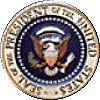
Warren G. Harding
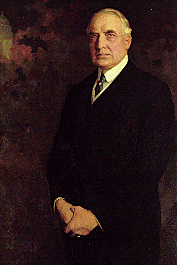
Although Warren Gamaliel Harding was a tall, handsome man who looked
presidential, he found it difficult to actually live up to the role. Harding
liked people and needed for them to like him in return. He found it hard to
say no to friends, and he had friends that needed to be told "no."
Harding once said that "I have no trouble with my enemies. . . . But my
friends, they're the ones that keep me walking the floor at night."
In 1899, Warren Harding was an Ohio newspaper publisher and aspiring
politician when he met Harry Daugherty, a Republican political figure.
Daugherty instantly recognized that Harding looked like a President, and he
decided to guide Harding's career. Harding became a state senator and then
lieutenant governor of Ohio. In 1915, he was elected to the Senate. Harding
missed more than two-thirds of all roll-call votes in the Senate and took
little interest in legislation. However, he did show energy in using his
office to find jobs for his friends.
At the 1920 Republican convention, Daugherty skillfully and successfully
lobbied for Harding as a compromise presidential candidate. Harding's opponent
in the election was Democrat James Cox. Harding campaigned on a promise to the
war-weary nation to "return to normalcy," and won by a large margin.
Harding's administration had a number of triumphs, but it also produced more
than its share of scandals. Both can be attributable to the people the
President appointed to his Cabinet. Some of them were honorable, reputable
men. But others were dishonest -- the "friends" that gave Harding so
much trouble.
Among the more successful Cabinet members were Secretary of State Charles
Evans Hughes and Commerce Secretary Herbert Hoover. Hughes successfully
organized the Washington Conference for the Limitation of Armament. At the
conference, The United States, Great Britain, France, Italy, and Japan agreed
to limit the size of their fleets. Secretary of Commerce Herbert Hoover worked
tirelessly to improve the government's regulation of business and the economy.
But other Cabinet members were not so dedicated. Secretary of the Interior
Albert Fall, Attorney General Harry Daugherty (the President's longtime
manager), and other figures in the administration were accused of fraud,
conspiracy, and receiving bribes. It soon became apparent that the Harding
administration was the most corrupt since the Grant years.
Harding himself did not live to see the full disgrace of his presidency.
Harding was returning from a tour of the West Coast when he died suddenly on
August 2, 1923.

Calvin Coolidge
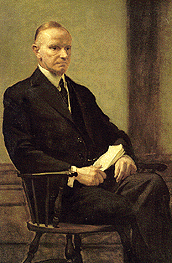
Calvin Coolidge was the most taciturn man ever to occupy the White House. His
retiring nature and shortness of speech became a national myth. A Washington
socialite once came up to Coolidge and told him that she had made a bet that
she could get him to speak more than two words to her. Coolidge replied:
"You lose."
Coolidge grew up in Vermont, and all his life retained typical New England
values -- honesty, reticence, and pragmatism . He studied law at Amherst
College in Massachusetts, where he settled and where he steadily rose
politics. In 1918, he was elected governor.
When the Boston police went on strike, Coolidge gained national attention. He
declared that "there is no right to strike against the public safety by
anybody, anywhere, any time." Firing all strikers gained him a reputation
as a law-and-order governor.
The Republicans chose Coolidge as their vice presidential candidate in 1920.
Warren G. Harding and Coolidge won the election. When Harding unexpectedly
died in February 1923, Coolidge found himself President.
Coolidge believed that government should leave a prosperous economy alone.
This philosophy suited the public mood in the booming 1920s, and Coolidge's
inactivity made him a popular President. Few suspected that the seeds of the
Great Depression were sown in the Coolidge years. In 1924, he ran for
reelection. The expanding economy helped him defeat Democrat John Davis by a
wide margin.
Coolidge chose not to run for reelection in 1928. He retired to Northhampton,
Massachusetts, and wrote his autobiography and magazine articles. He died of a
heart attack on January 5, 1933.

All images of Presidents are courtesy of whitehouse.gov
Information taken from Software titled "American Heritage The History of
the United States for Young People.
The copyright belongs to: Forbes
Inc. and Byron Preiss Multimedia Company. Thank You!

Washington, Adams, Jefferson
Madison, Monroe, Adams
Jackson, Van Buren, Harrison
Tyler, Polk, Taylor
Fillmore, Pierce, Buchanan
Lincoln, Johnson, Grant
Hayes, Garfield, Arthur
Cleveland, Harrison, Cleveland
McKinley, T. Roosevelt, Taft
Wilson, Harding, Coolidge
Hoover, F. Roosevelt, Truman
Eisenhower, Kennedy, Johnson
Nixon, Ford, Carter
Reagan, Bush, Clinton
Bush, ????, ????
|

|
All graphics and
pages are copyright © 1997 - 2008 Pages 4 Ever
(except where noted). Do not take, copy, steal, plagiarize or use in any
way, shape or format without the express written permission of Pages
4 Ever.
Some backgrounds and graphics made from clipart acquired from ArtToday, Boxed Art,
friends, my own imagination, and/or
graphic CD collections that I have purchased. If you find anything on this site
that you have copyright to, and can prove it, please let me know and I will
gladly either remove it or place a link back to you, whichever you prefer.
If you should find any broken links, please drop us a line and let us know the
exact URL the broken link is on. Thank you.
|

|
![]()





